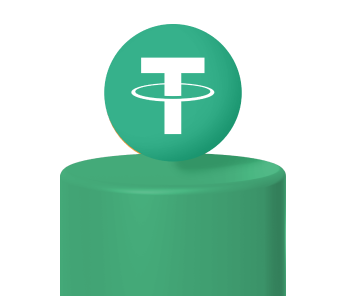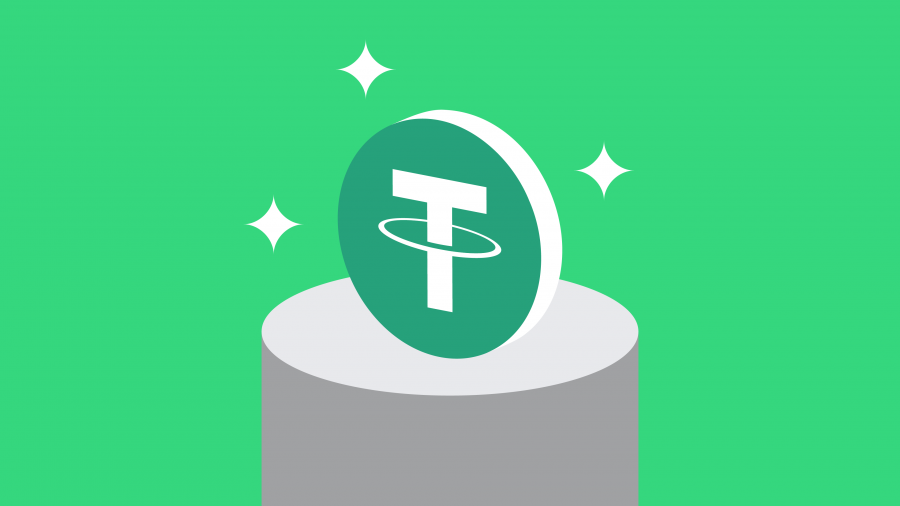Thanks to its peg to the dollar, the price of Tether combines the stability of fiat currencies with blockchain technology. Discover how it works.
What is Tether (USDT)?
Tether (USDT) is a stablecoin, a cryptocurrency whose value replicates that of a fiat currency (such as the dollar or euro) or commodities like gold. The project’s name is derived from the English verb “to tether,” meaning “to tie.” Tether’s price is tied to the US dollar. Today, Tether is issued by Tether Ltd, a company based in Hong Kong.
Launched officially in 2014 under the name “Realcoin,” the project has its roots in Mastercoin, the first ICO ever developed. Tether was created by Brock Pierce, Craig Sellars, and Reeve Collins, the founders of Mastercoin. These three entrepreneurs are now well-known figures in the crypto universe. The USDT token was initially exclusively based on the Bitcoin blockchain via the Omni Layer Protocol. Over the years, due to Tether’s success within the Web3 community, the number of blockchains supporting USDT has expanded to include Ethereum, Algorand, and Solana. Soon, USDT will also be supported on the Polkadot blockchain.
What is USDT?
USDT is the token issued by Tether Ltd and is a multichain cryptocurrency, meaning multiple blockchains support it. As a stablecoin, USDT’s value was initially pegged to the dollar (USD): one unit of USDT equals 1 USD (following a 1:1 ratio). The issuance of USDT is backed by large reserves of fiat currencies, which aim to ensure the dollar peg and stability.
Why follow the price of Tether?
Tether is a stablecoin that plays a crucial role in decentralised finance (DeFi): the USDT token is used in numerous DeFi protocols (such as Aave, Solana, or UniSwap). USDT is used to transfer money and make payments worldwide and is currently one of the most widely used stablecoins. Tether (USDT) is one of the highest market capitalisation stablecoins along with USD Coin.
Additional information
- To learn more about Tether (USDT), visit the official website
- Check out the documentation
- Read the whitepaper
- For any questions, you can contact the Tether’s team
- Further Reading: Academy – Tether: the crypto-dollar
USDT in the context of MiCA
The entry into force of European Regulation No. 2023/1114 of 31 May 2023, relating to Markets in Crypto-assets (MiCA), marked a fundamental milestone for stablecoins and the digital asset market across the entire European Economic Area (EEA). The first block of the regulation came into effect on 30 June 2024, significantly impacting stablecoins. MiCA defines stablecoins into two main categories: Asset-Referenced Tokens (ART) and E-money Tokens (EMT), for which specific requirements are outlined in Articles 16 and 48 of the regulation. Additionally, on 25 June 2024, the Italian government approved a Legislative Decree to align the national regulatory framework with the MiCA Regulation, ensuring coordination with the existing sector regulations in Italy, particularly the TUB and the TUF.

Disclaimer
This marketing communication is issued by Young Platform S.p.a., an authorised cryptocurrency exchange and a registered digital asset service provider in France (Prestataire de Services sur Actifs Numériques – Autorité des Marchés Financiers) and in Italy (Operatore Valute Virtuali (PSV1) – Organismo Agenti e Mediatori).
Young Platform S.p.a. is not responsible for such content nor for any errors contained within it or actions taken in relation to it. The content of the news and third-party reviews or opinions is provided for informational purposes only and should not be considered investment advice. This information does not constitute a recommendation to purchase or sell a particular digital asset or an investment strategy. Young Platform S.p.a. makes no warranties as to the accuracy, suitability, or validity of the information provided or any particular asset. Prices are provided for illustrative purposes only and may vary. The data presented may reflect assets traded on the Young Platform S.p.a. platform and on selected other cryptocurrency exchange platforms.


